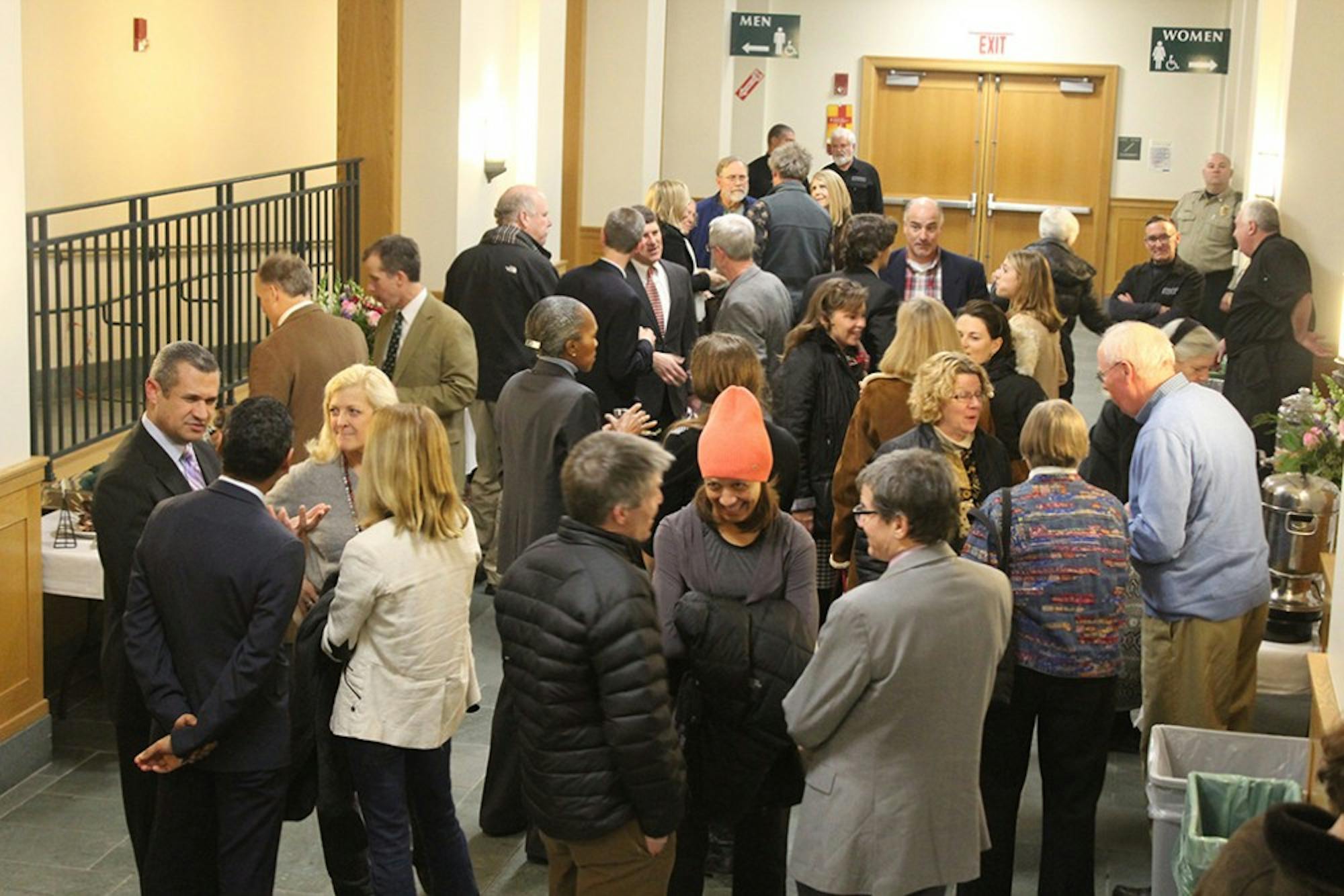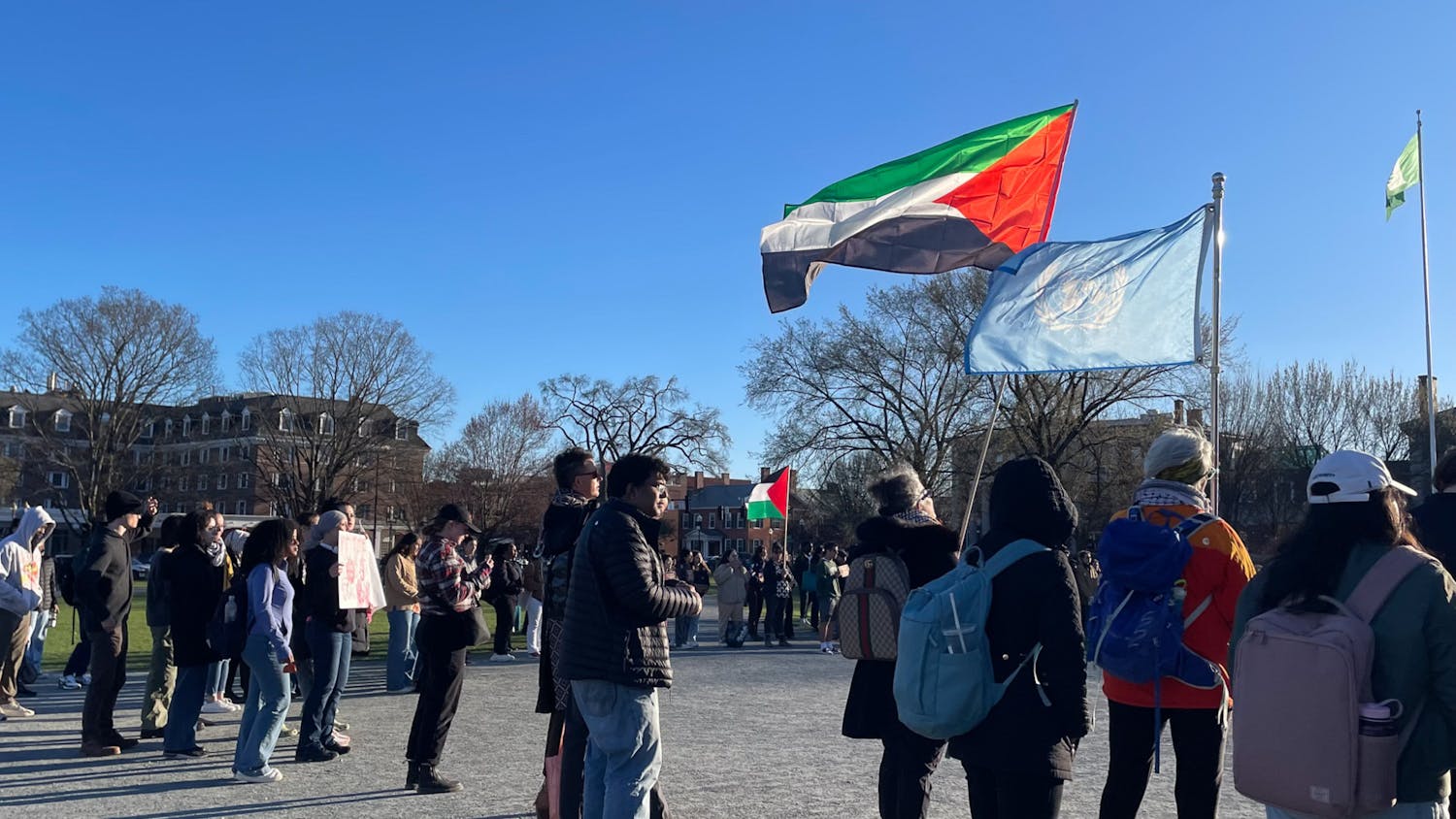On May 23, 1962, Martin Luther King Jr. lectured to an overflowing audience in the basement of Dartmouth Hall on the state of social justice in America and the ongoing civil rights movement. Thursday evening, Dartmouth’s Martin Luther King Jr. Social Justice Awards aimed to echo his message 54 years later.
Held in Filene Auditorium, the 15th annual ceremony was co-sponsored by the Martin Luther King Jr. Celebration Committee, the Office of Institutional Diversity and Equity, the William Jewett Tucker Center, the Dartmouth Center for Service and the Geisel School of Medicine.
“The awards were created to find those people in our community, both local and at Dartmouth that were doing work in social justice, environmental justice,” Martin Luther King Jr. committee co-chair Sara Campbell said. “We’re looking for the people that were doing their life’s work and looking to change the world. That’s the message Dr. King gave us.”
Six awards were granted to honor those “constantly seeking to make the world a better place,” vice president for Institutional Diversity and Equity Evelynn Ellis said. The awards were established to recognize members of the Dartmouth community and its affiliates who have “contributed significantly to peace, civil rights, education, public health, environmental justice, or social justice,” according to the Social Justice Awards website. The Social Justice Awards are also meant to encourage others who are losing motivation and assure them that they are being noticed and appreciated, Ellis said.
She added that the recipients can be nominated by friends, colleagues or public entities.
Campbell noted that the evaluation process beings in February, as the committee debriefs the past year’s awards and discusses goals for the upcoming year. In the spring, committee members ask for nominations through advertising and solicitations to identify deserving award recipients.
“They are people who work very hard, year in and year out, get all the work and all the criticism,” Ellis said. “Rarely, do we stop and say, ‘We appreciate this group. You’re moving us forward.’”
The awards are given in the following four categories: Emerging Leadership, Ongoing Commitment, Lifetime Achievement and Student Organization. Additionally, two other awards are granted to honor the legacy of Dartmouth community members. The Holly Fell Sateia Award honors a Dartmouth employee who is not paid to do social justice work, but still goes above and beyond in their actions. The Lester B. Granger ’18 Award for Lifetime Achievement exemplifies a lifelong commitment to public service and innovation in aiding an underserved population.
David Gordon ’00 received the Emerging Leadership Award for his work in training healthcare providers and supporting them as they implement operational changes in patient healthcare facilities. His organization, the Collaboration for Locally-Driven Improvement in Pediatrics, works bottom-up in resource-limited hospitals. With international medical and public health experience including projects in Ecuador, Uganda, Turkmenistan, Lesotho and Kenya, Gordon is training physicians and establishing international communication to support doctors and patients around the world.
The Ongoing Commitment award was granted to Nancy Bloomfield ’99 to honor her work with families involved with Vermont’s child protection system through her efforts as a family engagement specialist with Easter Seals Vermont, a disability services organization. Bloomfield also communicates with a variety of organizations in the Upper Valley. As the executive director of the state-designated parent-child support center Family Place, she helps young children get off to a healthy start and promotes long-term family well-being through a variety of on-site and home-based programs. She also encourages youth advocacy in issues relating to crisis counseling and housing-related programs.
Studio art professor emeritus Ashley Bryan received the Lifetime Achievement award in absentia for his meaningful work in bringing African history to children. As an award winning children’s book author and illustrator, Bryan connects the past and the future by writing introductory books of African-American spirituals, stories from the African oral tradition for children’s literature. His past honors include the Coretta Scott King–Virginia Hamilton Lifetime Achievement Award, the Laura Ingalls Wilder Medal and the New York Public Library’s Literary Lions award.
Ellis said she plans to travel to Bryan’s home on an island off the coast of Maine to personally deliver the award, as he was unable to attend the ceremony.
The Urban Health Scholars , a Geisel student group that trains medical students interested in serving medically underserved urban populations, received the Social Justice Award for Student Organizations for their holistic approach to healthcare. The group connects Geisel students with shelters and clinics, hosts educational events, discusses scholarly papers and brings speakers to campus.
The Holly Fell Sateia Award was granted to associate director of Safety and Security Keysi Montás to honor both his approach to campus safety and his concern for students. A teacher, poet, fiction writer and former University of New Mexico policeman, Montás is deeply concerned about physical and emotional safety as he questions student development in the collegiate setting.
“If every person who is in law enforcement or Safety and Security had the mind of this man, we would not have Ferguson, we would not have Baltimore,” Ellis said. “We would have none of that because of his holistic way of viewing Safety and Security.”
Christopher Keating ’86 was granted the Lester B. Granger ’18 Award for Lifetime Achievement. Keating, an advocate for equal justice, serves as the executive director of New Hampshire’s Judicial Council.
“I want to make sure people understand the cost of the death penalty, as it relates to the financial and opportunity costs,” Keating said.
Under his tenure, New Hampshire established eligibility guidelines and performance standards for attorneys providing representation to the indigent accused, increased funding for appointed counsel in major crimes cases and created mechanisms to fund representation in capital post-conviction proceedings.
Ellis said the awards are meant to encourage the Dartmouth community to continue to be involved in social justice work, a pursuit that may often be unrecognized.
“What we want them to do is pause and let us say thank you,” Ellis said. “Thank you for doing this. What we also say to them is, ‘Tomorrow get back to it!’”
Correction appended (Jan. 29, 2016):
The original version of this article incorrectly identifiedassociate director of Safety and Security Keysi Montás as a former New York City policeman. He was a former University of New Mexico police officer.
Alexa Green is a junior from Boca Raton, FL. She is majoring in English, with minors in Arabic and Public Policy. After joining the newspaper her freshman winter, she served as a beat reporter covering Hanover & the Upper Valley. Following this position, Alexa became the associate managing news editor. Outside of the newsroom, she is a tour guide on campus, works for the Rockefeller Center for Public Policy, and conducts research in the English department. During her off term, Alexa worked for I.B.Tauris, an independent publishing house in London, U.K., editing and publicizing international relations and politics books. She is passionate about the ways in which policy, current events, history and journalism have interconnected roles in defining global issues.




